Category: Sin categorizar
RESCUED BIRDS OF PREY ARE REHABILITATED AT QUITO AIRPORT

- Quito Airport has the country’s first center specializing in the rehabilitation and training of birds of prey.
- The Ministry of the Environment provided two birds of prey for rehabilitation and reintegration into their natural habitat.
Quito Airport received two vulnerable birds of prey which had been rescued in Sucumbíos Province by the Ministry of the Environment. On this occasion a King Vulture (sarcoramphus Papa) from the condor family with a wounded wing and an Osprey (pandion Haliaetus) that had had its feathers cut were taken in. These specimens entered the bird of prey rehabilitation center set up at Quito Mariscal Sucre International Airport, as part of its Wildlife Control Program which uses falconry as a principle method.
The rehabilitation center, the first specializing in birds of prey in Ecuador, is tailored to carry out various types of treatment for the recuperation of these birds thanks to its facilities, ample space and highly trained and specialized scientific and technical staff from the Faunaetus organization, hired by Quiport to manage Wildlife Control at the Airport.
The main objective when receiving a bird is to rehabilitate it and release it into its habitat. However, in some cases birds are taken in that have already had too much contact with humans and cannot be released. In these cases, the birds may be part of the Airport’s Wildlife Control Program, guaranteeing very favourable living conditions since they are able to fly and keep active, something which does not occur in, for example, zoos.
The birds that arrive to be rehabilitated at the Airport are treated with various techniques such as feather implants, weight gain and muscle-building. In the case of birds that cannot be released into the wild, these also receive training and deterrence techniques.
The rehabilitation process of the two rescued birds will last for approximately one month before they are reintegrated into their natural habitat.
Falconry is key to the safety of the Airport
On various occasions we have been able to observe majestic birds flying over the Airport, but what many people don’t know is that these birds have been trained to control airport safety through an effective method that aims to scare away small fauna using birds of prey.
This environmentally friendly discipline consists of training birds of prey to prevent other species from accessing the vicinity of the Airport and to guarantee the safety of operations which may be affected by the presence of fauna.
Falconry, a practice which has been used for centuries and whose origins date back to ancient China, has been quite effective given that the presence of birds around Quito Airport has been significantly reduced.
Currently, the Airport’s Wildlife Control Program has 11 birds that have been trained to discourage the presence of other species in a natural way, since if animals sense the presence of predators they will avoid the zone under the predator’s control, in this case the Airport.
Corporación Quiport, in charge of managing the Airport, introduced the program in 2013. There are only a few airports in the region that have falconry programs for controlling wildlife.
AVIATION PHOTOGRAPHY AT MARISCAL SUCRE
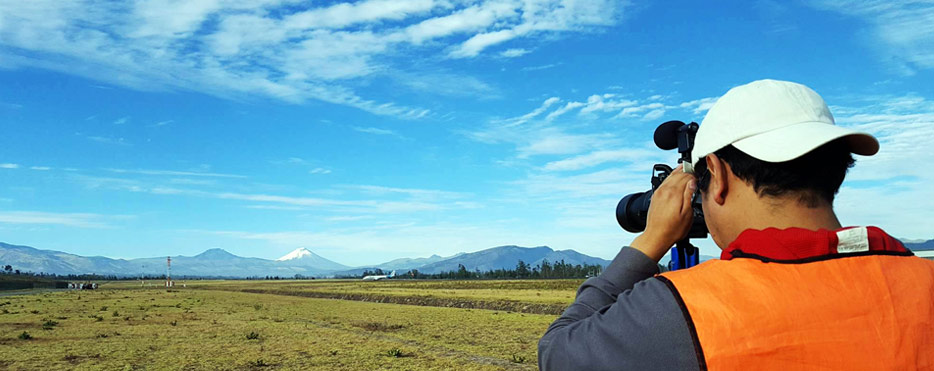
On Saturday, August 6, the Quito International Airport received a special visit from 29 aviation photography enthusiasts who enjoyed a cloudless morning and afternoon, perfect conditions for capturing impressive photographs with a wonderful view of Cotopaxi Volcano.
Spotting is the hobby of recording and photographing the aviation world (planes and airports). It is an activity that has developed over recent years in Ecuador and there is an ever increasing number of persons who share this interest.
During the morning the spotters set up on the southeastern perimeter and, taking advantage of the light at this time, achieved impressive shots with a cloudless background view of Cotopaxi Volcano.
After a short break, the participants returned in the afternoon to continue with their hobby, this time setting up on the southwestern perimeter to capture shots from a different viewpoint.
The event was organized by ‘Ecuador Aviation Photography’ and the visit is just one of several that have already taken place in recent years at Quito International Airport.
Corporación Quiport has given its support at all times to the participants, always guaranteeing the safety of the airport.
NEW EXHIBITION OF REPTILES AND AMPHIBIANS AT QUITO AIRPORT
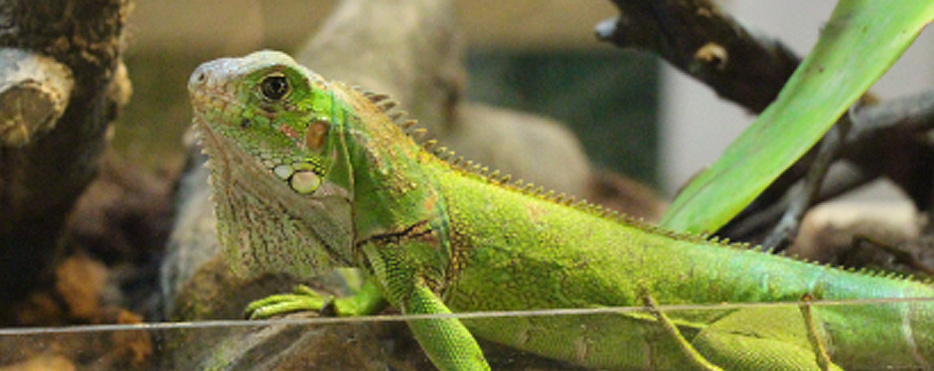
ExpoVivarium is on display until 31 December 2016 at Quito Airport Center, located in front of the Mariscal Sucre Airport passenger terminal. This is a space for learning and interaction allowing visitors to observe and learn to appreciate the diversity of reptile and amphibian fauna in Ecuador. The exhibition is part of an itinerant display that is permanently shown at the Quito Vivarium and has arrived at the airport thanks to the initiative of Quito Airport Center and Gustavo Orcés Herpetological Foundation.
At the exhibition, passengers and visitors of Quito Airport can observe a variety of amphibian and reptile species from the coast, highland and amazon regions of the country. Many examples have been rescued from illegal trafficking or from homes where they were kept as pets.
In addition to observing these species, visitors have the option to receive an environmental talk and at the end of the visit can have a photograph taken with one of the snakes.
The exhibition is open from 10:00 to 19:00 (Wednesday to Monday) on level 2 of the Quito Airport Center, where accessories and themed objects are also on sale such as jumpers, scarves, artisanal objects and books.
This type of initiative helps to bring different and novel experiences to visitors and passengers while encouraging informative activities and respect for nature, placing Quito Airport at the forefront of the airport industry.
HOTEL WYNDHAM QUITO AIRPORT WAS OFFICIALLY OPENED
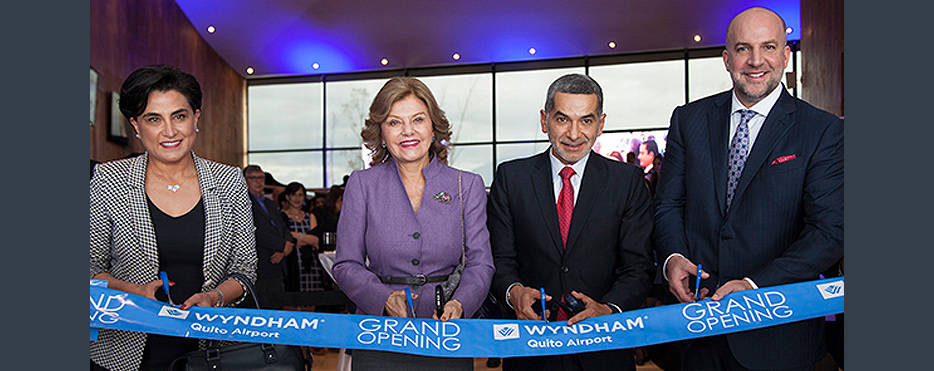
- The presence of the hotel just a few meters from the airport passenger terminal will broadly benefit users, passengers and airlines.
- The Wyndham Quito Airport—financed, constructed and operated by Pronobis—has 150 modern and spacious rooms.
This morning, the Hotel Wyndham Quito Airport was officially inaugurated at a ceremony attended by authorities and special guests. In a speech Mrs. Isabel Noboa Pontón, President of Consorcio Nobis, described the work as “a marvellous building that is a visual delight from any angle you look at it and from now on it is a technological benchmark in terms of construction, comfort and service”. The new hotel is characterized by its impressive architectural structure that evokes the majesty of the Andean Condor with wings outstretched, a national symbol of the country.
Mrs. Noboa said she was “very pleased on this occasion to contribute to the progress and development of the country through the production and creation of new jobs” and emphasised the role of Quiport as a strategic partner that actively participated throughout the development of the project.
The presence of the hotel just a few meters from the airport passenger terminal will broadly benefit users, passengers, airlines and other players in the air transport industry. Additionally, it provides an unbeatable lodging option for passengers who must connect to other flights in less than one day, as well as for flight crew.
Andrew O’Brian, President and CEO of Corporación Quiport, concessionaire of Mariscal Sucre Airport, explained that “the need for a first-rate hotel on the airport’s land was identified by Corporación Quiport since the initial stages of the new Quito International Airport project. With the inauguration of the Hotel Wyndham Quito Airport, the Quito Airport City will continue to grow to complement the services offered at the airport terminal”.
The Hotel Wyndham Quito Airport—financed, constructed and operated by Pronobis—has 150 modern and spacious rooms, each one with satellite TV, individual climate control, mini-bar and private bathroom. Various additional services are also available such as Wi-Fi, laundry, parking, and a fitness centre with a gym, jacuzzi, steam room and massage service.
The building, designed to offer a first-rate service, also boasts a modern lobby with welcoming rooms. During their stay, guests may enjoy excellent national and international gastronomy in the panoramic restaurant, the bar or, if they prefer, in the comfort of their rooms 24 hours a day.
The hotel´s six event rooms and three banquet rooms with a capacity for up to 300 people are ideal for all kinds of events, meetings or conferences. These facilities are complemented by a modern and functional Business Centre.
Mr. O’Brian thanked the teams at Quiport and Pronobis who from the start have shared a vision to work together on a world-class project, and also thanked the Mayor of Quito, Mr. Mauricio Rodas, and Quito Turismo, Empresa Pública Metropolitana de Servicios Aeroportuarios and central government authorities for their unconditional support for the consolidation of this important work.
Quito Airport has just won South America’s Leading Airport for the third consecutive year at the World Travel Awards 2016 held in early July, and the support of Corporación Quiport´s strategic partners such as Pronobis has undoubtedly been fundamental in achieving this recognition.
MARISCAL SUCRE AIRPORT CONFIRMS ITS LEADERSHIP IN SOUTH AMERICA

More information: Luis Galárraga
Telephone: 395-4200, ext. 2906
0995-029-525
- Quito Airport received a World Travel Award for the third consecutive year.
- The awards are regarded as the Oscars of the tourism industry.
- Corporación Quiport works on several fronts to continuously improve the levels of service provided to the users and passengers of the airport.
Lima, 02 July 2016. For the third year running, Mariscal Sucre International Airport won the World Travel Award in the category of South America’s Leading Airport. These awards are regarded as the Oscars of the tourism industry given that they are the most prestigious awards on a global scale in this area of activity.
At a gala ceremony which took place on Friday, 1 July at the Swissôtel in Lima, Perú, Andrew O’Brian, President and CEO of Corporación Quiport (concessionaire of Mariscal Sucre Airport) accepted the trophy which confirms Quito Airport as a Leader in South America.
This award rewards the work carried out by Mariscal Sucre Airport on three principal fronts: increasing connectivity, improving services and operating with the highest security standards, with very satisfactory results which are acknowledged by our passengers and by the industry.
“For a third time we have achieved recognition as leaders in South America and this achievement is not the fruit of chance but the result of well-planned work characterized by innovation in the management of the airport, commitment to the development of the city and excellent service to our passengers”, stated Andrew O’Brian, adding that “this award belongs to the city and the country, but also to all those who in one way or another provide services at Quito Airport”.
He added that this new honour, far from being an end, obliges Quiport to renew its commitment to maintain and exceed the highest standards of operation and service of the airport industry. “Today we are very happy with what we have achieved, however, tomorrow we will be working on seeking new opportunities to continue improving, not to win an award, but because the city and our passengers deserve it”, he concluded.
The World Travel Awards rewards positive contributions to the development of the tourism sector on a local and international scale in each of the categories. A winner is chosen by means of a voting process open to the public on a global scale, and votes cast by verified travel professionals carry a weighting of two.
WE’VE UPDATED OUR WEBSITE
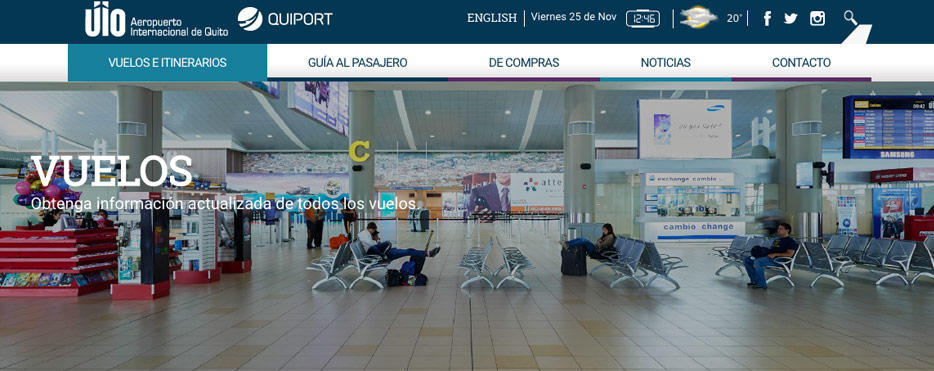
In addition to providing an efficient search for flights, the new website has a greater focus on passenger service to make it easier for passengers to find the services they require such as shops, restaurants, duty free, as well as information on airport procedures.
One of the main changes is the addition of virtual tours on the website to enable passengers to orient and familiarize themselves with the Airport before their journey. Now it is possible to take a virtual tour of the departure lounges regardless of whether you are taking a domestic or international flight.
The new website has modernized its aesthetic and its features which use Responsive Design to optimize visual resources across all desktop and mobile devices.
We invite you to be a part of Quito Airport’s new web experience!
Visit us at: www.aeropuertoquito.aero.
EMERGENCY TERMINA BUILT BY QUIPORT MADE IT POSSIBLE TO RESUME CONNECTIONS WITH MANTA
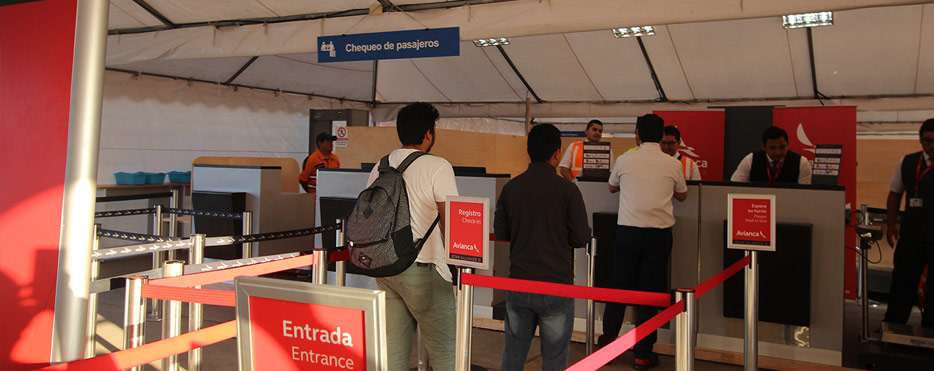
The city of Manta lost contact via air with the rest of the country after the 7.8° magnitude earthquake of April 16 that hit Ecuador and damaged the Manta’s Eloy Alfaro Airport passenger terminal leaving it unable to be used for commercial flights. It was vitally important to recover that connection in order to face the emergency in the country’s North-Center Coastal region that was devastated by the earthquake and, especially, to allow the city to begin normalizing its activities.
Flights were resumed thanks to an emergency passenger terminal built by Corporación Quiport – the Mariscal Sucre Airport concessionaire – in coordination with the Civil Aviation Directorate (“DGAC”) and Avianca’s support as a means to help the country to overcome the emergency.
Quiport and the Mariscal Sucre Airport have been providing their valuable cooperation during the emergency by coordinating flights carrying aid, rescue workers, doctors and volunteers from Quito to the areas hit by the earthquake and also coordinating flights coming from abroad with donations. “However, we wished to help even more efficiently, and that is why we identified that our contribution would be the rehabilitation of the Eloy Alfaro Airport so that it could once again handle regular commercial flights as soon as possible and, thus, resume that city’s connection with the rest of the country. We felt, as airport professionals, that this was our duty”, Andrew O’Brian, CEO of Corporación Quiport explained.
A team of Quiport engineers and technicians traveled to Manta to perform an initial evaluation to implement the project. Once the requirements were determined, a plan was submitted to the DGAC and approved by the authority.
Nine Quiport technicians traveled to Manta on April 22 to build the project during one single weekend. The first step was to bring electric power as well as a communications system to the site. Then the tents that would house the terminal areas were set up and the same equipment – that fortunately was intact – from the damaged terminal was used.
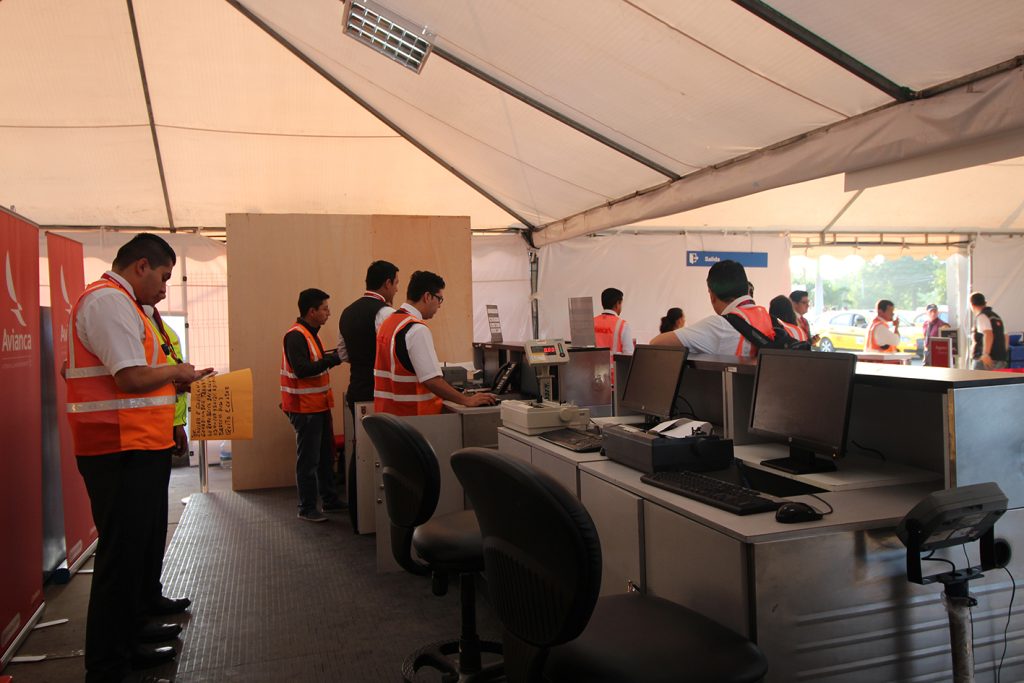
The emergency terminal is now located on a platform adjacent to the building that was affected by the earthquake. It offers basic infrastructure for passenger arrivals and departures, airlines check-in facilities, screening controls, and boarding and baggage delivery areas.
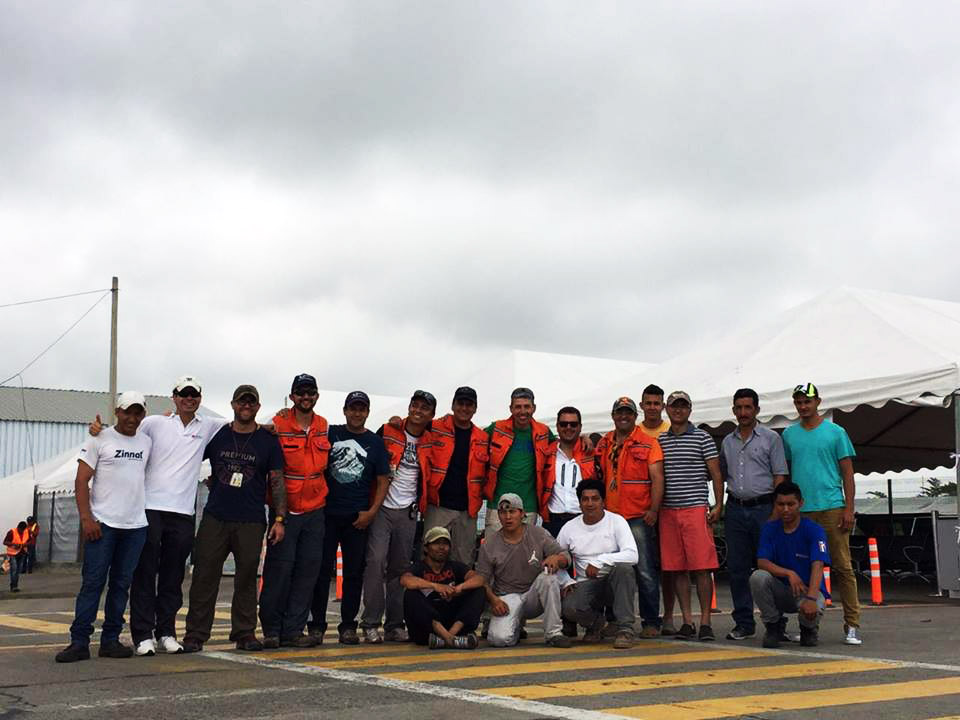
Once the emergency terminal was ready, it was delivered to the DGAC on April 24 so that it could start operating immediately. Adriano Zambrano, the DGAC Airport Administrator in Manta, was pleased with the result and highlighted the importance for Manta to have regular commercial flights once again.
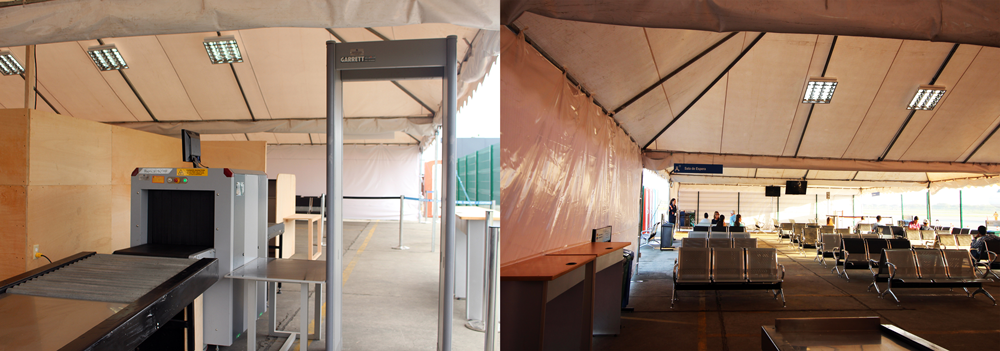
Manta’s emergency terminal began to operate on Monday, April 25, until a medium and long term solution can be designed in order to recover the infrastructure affected by the earthquake – one of the most devastating in Ecuador’s recent history.
SKYTRAX DISTINGUISHES MARISCAL SUCRE AIRPORT AS THE BEST REGIONAL AIRPORT IN SOUTH AMERICA
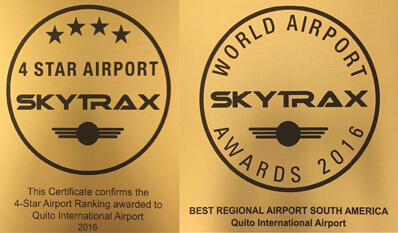
- Additionally it was placed sixth on a global scale in the category of 5 to 10 million passengers per year.
- It received four stars for the high standards of quality offered to its users and passengers.
- It also obtained prominent positions in several other categories.
Quito, 18 March 2016. Mariscal Sucre International Airport has been declared as the Best Regional Airport in South America in 2016 by Skytrax at the World Airports Awards 2016, at a ceremony held in Cologne, Germany on 16 March 2016.
The Skytrax World Airport Awards are the most prestigious accolades for the airport industry voted by passengers in the largest, annual global airport customer satisfaction survey. The awards are based on 13.25 million survey questionnaires completed by 106 different nationalities of airline customers during the survey period. The survey operated from June 2015 to February 2016, covering 550 airports worldwide and evaluating traveller experiences across different airport service and product key performance indicators – from check-in, arrivals, shopping and security to immigration. The Skytrax World Airport Awards are a global benchmark of airport excellence.
The Best Regional Airport category includes airports that do not function as a hub, as is the case of Mariscal Sucre Airport.
In addition, Quito´s airport is placed 62nd in the global ranking of airports published by the organization; sixth in the category for Best Airports: 5-10 million passengers per year; seventh among the Most Improved Airports, and third in the Best Airport Staff in South America category.
A four star airport
A team of auditors from Skytrax visited the airport in November 2015 to evaluate all services at the air terminal geared towards the passenger experience including signage, flight information, transport, parking, cleanliness, seating, lighting, digital information channels, baggage area, boarding gates, bathroom availability, airline check-in area, commercial offering and VIP lounges.
As a result of the audit, Mariscal Sucre Airport obtained a four star rating on a five-star scale. Skytrax awards the four star rating to airports that deliver a service with high standards of quality to its users and passengers.
The report prepared by Skytrax highlights areas such as parking services, availability of seating in departure lounges and public halls, banking and currency exchange facilities, flight information, check in and commercial offering. But areas that clearly stand out are the cleanliness of the terminal, free Wi-Fi service and comfort of the Domestic and International VIP Lounges.
It is worth noting that Quito Airport and El Dorado Airport in Bogota are the only airports in the Latin America and Caribbean region to have obtained the four star rating. This recognition places us in the same category as important airports such as London Heathrow Airport, San Francisco Airport in the USA, Paris Charles de Gaulle, Shanghai International Airport in China, among others.
The industry rewards high quality services
“This is a double honour (Best Regional Airport in South America and a four star rating) that fills us with pride. The results of our focus on passenger service are clear. Travellers who pass through Quito Airport appreciate the quality of service that they receive and this is recognised by the key players in the air transport industry”, stated Andrew O’Brian, President and Director General of Corporación Quiport, the airport concessionaire.
In effect, Mariscal Sucre Airport has been rewarded by both the passengers and the industry, demonstrating a consistently high level of service. What is the ideal formula? Andrew O´Brian explains that in addition to the view of service coming from the management of the company, it is essential to have a qualified, professional, very motivated and committed team.
“We have new, modern and comfortable infrastructure, but today´s traveller expects much more. Air terminals are no longer just buildings and waiting rooms; they are centres that bring together countless services geared towards improving the passenger experience. Our work consists of identifying what services are needed and valued by our passengers”, O´Brian explains.
“We are focused on constantly looking for opportunities for improvement. We are aware that things are not perfect and can humbly admit to our mistakes. It is the only way that we can improve our standards of service in a sustained manner”, he notes, before leaving a final message. “These awards are not an end; they are the beginning of great days for the airport service of Quito and Ecuador”.
QUITO INTERNATIONAL AIRPORT WINS SECOND PLACE IN LATIN AMERICA AND THE CARIBBEAN
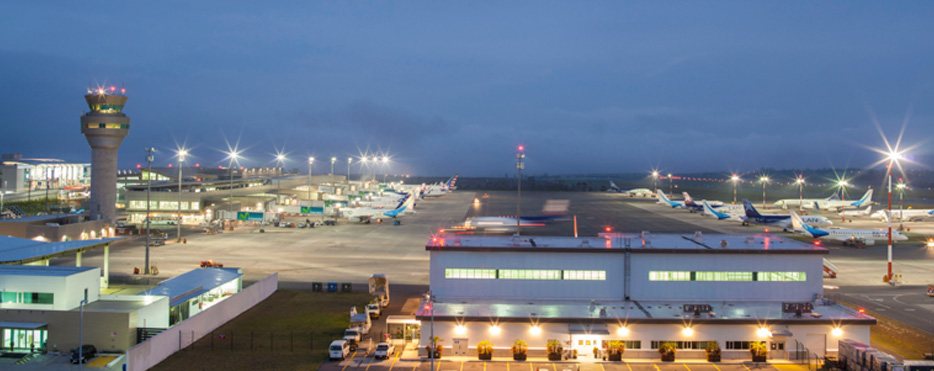
- Received the ASQ Award given by the Airports Council International for the second consecutive year.
- 300 airports from more than 80 countries participated in the ASQ programme.
Quito, March 1st, 2016. Yesterday, the Airports Council International (ACI)—an organization that regulates and represents 1,861 airports in 177 countries—revealed the results of the Airport Service Quality (ASQ) Awards for 2015 (the most prestigious international awards regarding airport services offered to passengers) for the Latin America & Caribbean region. Quito International Airport has achieved second place in this category for the second consecutive year among 18 airports that participated.
ASQ is the main benchmarking programme measuring passengers’ satisfaction with airport services across the globe, with the participation of close to 300 airports in more than 80 countries. In 2015, the results highlight the best airports in a variety of categories.
The ASQ Survey covers 34 key service areas and includes eight major categories, such as access roads, check-in, security, airport facilities, food and beverage providers, commercial offering and much more. All participating airports use the same survey questions. This creates an industry standard set of responses that allows the participating airports to track and analyse their performance as well as benchmark their results against airports across the globe. All participating airports may see the ASQ Survey results for all other participating airports confidentially.
“Airports’ increasing concentration on ensuring a stellar passenger experience is part of a larger trend,” noted Angela Gittens, Director General, ACI World. “Airports have evolved into complex, customer-focused businesses in their own right that in many cases are in competition with each other for passenger traffic. From duty free and restaurants to ambience, cleanliness, courtesy of staff, amenities, efficiency and more, air travelers are expecting big things from the airports through which they travel. More than anything, ASQ is a way for participants to measure the extent to which they deliver on these expectations.”
Andrew O’Brian, President and Director General of Corporación Quiport, concessionaire of Quito International Airport, noted that “the recognition given by ACI is a source of satisfaction and pride. However, at the same time, it commits us to continue searching for opportunities to improve our service since it allows us to carry out a comparative study of our weaknesses and strengths in relation to other airports on a global scale, with an emphasis on terminals with similar characteristics to our own.”
JETBLUE HAS STARTED ITS SERVICE FROM QUITO
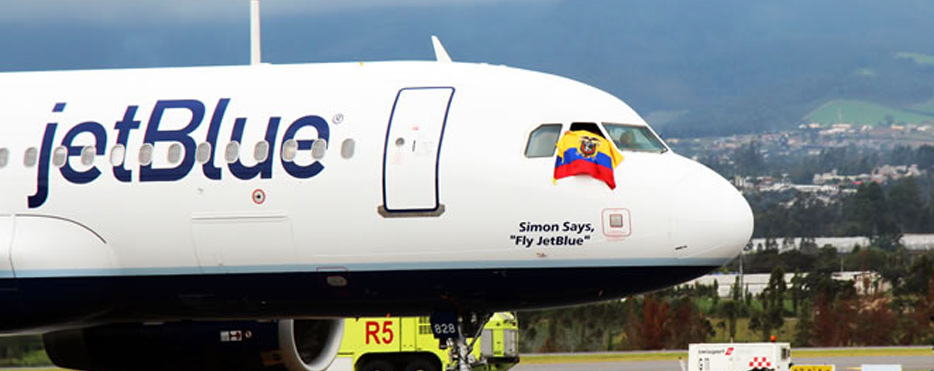
- The expectations are that the addition of the new airline will stimulate the growth of passenger numbers between Quito and Florida by 40%.
- The route, including seven flights a week, will be served by its Airbus 320 aircraft with a capacity for 150 passengers.
- This milestone is a demonstration of the growing importance of Quito and its airport as a premier destination on a regional scale.
Quito, 25 February 2016. This afternoon marked the arrival at Mariscal Sucre International Airport of the inaugural JetBlue flight joining the city of Quito to the city of Fort Lauderdale in the United States.
Upon its arrival at the capital´s airport, the airline´s Airbus 320 was received with a water arch salute from two fire engines of the airport´s Fire and Rescue Service, a traditional welcome in the aviation industry on important occasions. The addition of JetBlue to the roster of airlines at the Mariscal Sucre Airport is a sign of the growing importance of Quito as a premier tourism destination on a regional scale.
The International Quito Airport is the main entry point to Ecuador. Thanks to its technical characteristics, the airport has allowed a significant increase in connectivity for Quito and the country, at the same time offering more efficient operations for airlines and an excellent service for passengers.
Andrew O’Brian, President and Director General of Corporación Quiport (concessionaire of Mariscal Sucre Airport) explained that “the entry of this type of airline to the Ecuadorian market is very important as it is a stimulus for the market of this particular route. Currently around 180,000 passengers travel from Quito to Florida per year and we hope that this stimulus will see numbers on this route grow by 40%”.
At a special ceremony held at Mariscal Sucre Airport to mark the start of JetBlue´s service, Catalina Bretón, the company´s Commercial and International Planning Director, stated that “with this new route we expect the seat occupancy on flights to Fort Lauderdale to be similar to the occupancy rate throughout our network of routes, at around 85%, and given that we will offer a daily flight on single cabin 150-seat aircraft, we expect to transport approximately 93,000 passengers during the first year of operations”.
Andrew O’Brian emphasized that “the start of operations by JetBlue in Quito is an important milestone for connectivity between Ecuador and the United States. It is the result of intense work carried out over a period of more than two years”. He thanked JetBlue for its trust in choosing Corporación Quiport as its strategic partner in Ecuador and choosing Mariscal Sucre Airport for its operations.
For her part, Catalina Bretón expressed her satisfaction in bringing the “JetBlue Experience” to Ecuador. “We have shown that through our unique business model which combines low fares with high quality service, we have been successful not only in the United States but in Latin America and the Caribbean”.
The arrival of JetBlue is expected to have a positive impact on tourism from the United States and will provide Ecuadorian passengers with a greater offer of destinations from Fort Lauderdale since this airport acts as a connection hub from which JetBlue currently offers non-stop flights to more than 40 destinations, boosting connectivity to and from Quito.
